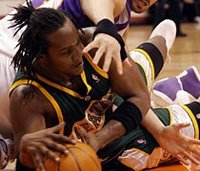 Last week, NBA journeyman and “flagrant foul machine” Danny Fortson lost his defamation suit against Suns owner Jerry Colangelo. The dispute concerned comments Colangelo made in 2003 after Fortson (then with Dallas) committed a flagrant foul leading Suns rookie Zarko Cabarkapa to break his wrist. At the time, the AP recounted:
Last week, NBA journeyman and “flagrant foul machine” Danny Fortson lost his defamation suit against Suns owner Jerry Colangelo. The dispute concerned comments Colangelo made in 2003 after Fortson (then with Dallas) committed a flagrant foul leading Suns rookie Zarko Cabarkapa to break his wrist. At the time, the AP recounted:
Fortson was called for a flagrant foul on the play, and Suns owner Jerry Colangelo said he will ask the NBA to fine or suspend the Dallas player.In October, 2004, Fortson sued Colangelo, the New York Post, and Peter Vecsey (Vecsey characterized Fortson—directly or by implication—as “thugged out,” a “vacant lot,” a “wanksta” and a “meaningless mass” in his column in the Post). The District Court (S.D. Fla.) granted summary judgment on June 5 in favor of Colangelo and the Post’s holding company (the Westlaw citation is 2006 WL 1589793) (Vecsey was never served a copy of the complaint).
"Whether it's a fine or a suspension, it's not enough for him," Colangelo said. "He should be put down for every day that he (Cabarkapa) is out. I'll do everything in my power to see that happens. With the game over, there was no need for that."
The injury came with 2:58 left and the Suns leading 112-88.
"He's a thug," Colangelo said.
Before leaving, Fortson said he apologized to Cabarkapa.
"I had no evil intent," he said.
Cabarkapa was in tears in the Suns' dressing room, but later composed himself and said through a translator, "I can't comprehend it. I don't know exactly what happened. I just know I was trying to drive to the basket and Fortson pushed me."
Mike has explained how hard defamation cases can be to win in connection with John Daly’s “Thug Life” case here and here Bob Lobel’s “drunk sportscaster” suit here.
Ultimately, Fortson was done in by the court’s characterization of Vecsey’s and Colangelo’s words as “rhetorical hyperbole” rather than fact. Rhetorical hyperbole falls on the non-actionable “opinion” side of the fact-opinion divide in defamation law. What the court calls Fortson’s “well-publicized history of overly aggressive play (fouls, ejections, fines, and suspensions)” didn’t help his case.
The court opined that “[t]o foreclose the use of hyperbole, under the threat of civil liability, ‘would condemn [sports commentary] to an arid, desiccated recital of bare facts.’”
While this story has been covered in the media in the past, no news outlet has yet reported the court’s opinion (as far as I can tell).





0 comments:
Post a Comment